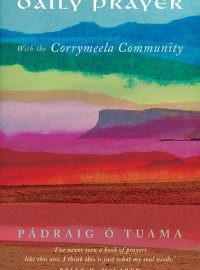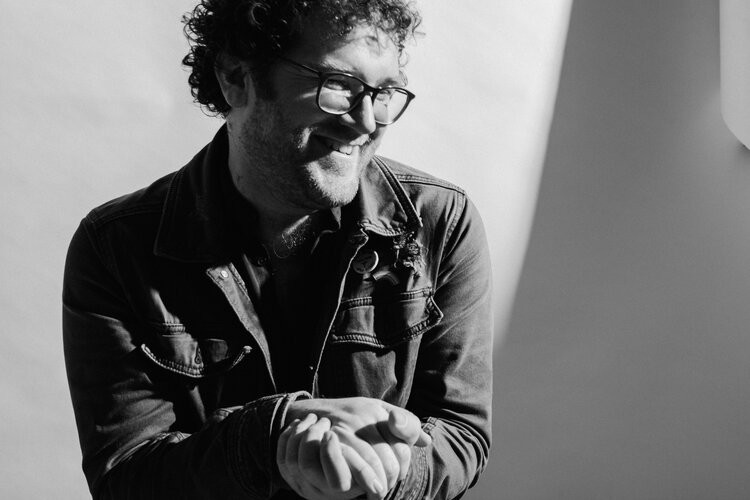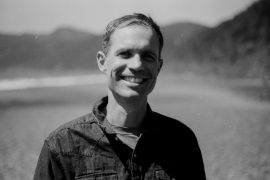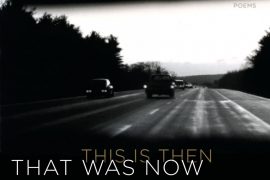We had the pleasure of speaking with Pádraig Ó Tuama just as Season 2 of his On Being podcast, Poetry Unbound, began. In addition to serving as curator and host of that program, Ó Tuama is a theologian, conflict resolution mediator, and the author of four volumes of poetry, Daily Prayer with the Corrymeela Community (2017), In the Shelter (2015), Sorry for your Troubles (2013), and Readings from the Books of Exile (2012), which was longlisted for the 2013 Polari First Book Prize. He holds a BA Div validated by the Pontifical College of Maynooth, an MTh from Queen’s University Belfast and is currently engaged in a PhD in Theology through Creative Practice at the University of Glasgow exploring poetry, Irishness and religion. He is based in Belfast.
Jason Myers: I love the line in your preface to Daily Prayer from the Corrymeela Community, where you refer to land as sacrament, which I think is surely as old as Genesis but perhaps not a widely held view in contemporary religious communities. It called to mind language from a number of other poets, particularly, of course, Seamus Heaney’s marvelous “Sense of Place,” where he applies the sacrament of marriage to our ways of naming and inhabiting land and refers to placenames as “love made to each acre” and the landscape as “a system of reality beyond the visible realities.” So I was just wanting you to tell me what land as sacrament means for you now, and how you and we might think about being priests to such a sacrament.

Pádraig Ó Tuama: Well, I suppose firstly I think of sacrament as something tangible that points beyond itself. Within the Catholic system, sacraments all involve something physical that’s happening. So water on a head; or the taste of bread on the tongue; or confession, words of reconciliation they call it; marriage – rings being exchanged; holy orders, there’s oil and confirmation there’s touch and the death sacraments, there’s oil as well. And in all of those, there’s something very physical. One of the things that I think is so important about that is not to say that they’re beyond, whatever the hell that might be, stooping to move into the physical, but that the physical is the everything.
I don’t know where I stand with questions with God, but I know that I’m very interested in questions of incarnation and the meat of things. Carne in the middle of the word incarnation means meat. Not just the meat of the human person, although that’s very important, but also the meat of daily reality and the meat of literally where we stand. And so, I suppose for me, being present in the here and now is a really important way of understanding what it means to be human now, what it means to be an artist now, and how we shape our ethics. When I hear ethics being shaped on an idea of the beyond — when you have the answer, then you make the answer fit into the answer you already decided you want — that concerns me.
The other part of the idea of sacrament is I think that we’re priests. Ultimately, priests aren’t the priests of sacrament, priests are the witnesses to it. And so, with an understanding of sacrament, you understand that you’re witnessing something much bigger than yourself. I think of “priest” as a verb, not as a noun. So as we have a sacramental understanding of the Earth and place, well then therefore, we are asked to pay attention to that as an indicator of something big and priestly and physically present here. So therefore, questions arise: who lived on this land? how has this land been cultivated? how should it be cultivated? what languages were spoken to the animals on this land? what animals lived on this land? what languages did they speak? what’s the trauma carried in this field? what’s the colonization, the seizing of the field?
Colonization comes from an old French word “colon” meaning field, so colonization means to seize a field, and to say “it’s mine now and I bring my Gods and my understanding of governance and ownership as well as my language and I will enforce something here that has never been forced in the relationship between people and the land before.” And so, for me therefore, land is sacrament. It is political, it’s personal, it’s agricultural, it’s psychological, and it’s ethical. And I suppose it is theological too in the sense that God might be found in whatever relationship we have with the ethics of doing something tangible right here, right now. I’m not interested in questions of God beyond that though, because I think it’s hard enough to do that without worrying myself about the hereafter.
JM: I love that. Your speaking to witness makes me think of my beloved, Jack Gilbert, who says that “the work of poets is to witness to magnitude,” which is an important calling that might also help cultivate loving, attentive relationships with the lands that we inhabit. Tell us about the landscapes that you cherish. What are their airs and aromas?

PÓT: All this year, I’ve been in County Fermanagh, right on the border with the County Donegal, and there’s a lake just thirty seconds walk away. My kitchen window looks out over a field into some trees beyond that field, and in that field there were lambs for months in the spring. And then, since the summer, it’s been a mixture of cattle and lambs, and sheep. Initially when the lambs were born, there must have been forty-five or fifty lambs born over the space of a week. And they ran around like small fluffy animals on speed for about six week; kept walking into each other, jumping on each other, humping each other, going wild. It was hilarious to watch. It was utterly entertaining to watch them rushing up to their mother to have a feed of milk. And it wasn’t that strange to see a small lamb go to the wrong one, and the sheep would just bat it away with her head.
That was extraordinary to watch, and then lockdown, for lots of people, gave us rhythms where we were working from home to look out the window and see what you’re seeing, you know? So, I started to learn the names of the birds that were coming through, see a hedgehog and a pine marten. There’s some hares that live nearby as well. And they’re quite amazing, they’re very important animals in Irish mythology, they’re the messenger to the underworld. So it’s speed and trustability, it’s called ‘giorria’ in Irish, meaning ‘the low deer.’ Which I think is such an important way of imagining it. When people call a hare a ‘bunny,’ I just laugh because I think you clearly haven’t looked at this powerful animal – that can sprint fifty miles an hour – paying attention to the shape of its head and its beautiful ears, and how alert it is.
So this land is gorgeous.
It’s political, too, because, a couple of fields away there’s the border, whatever the hell that means. The partition of Ireland happened in 1921, so, 2021 will be a century of that. During a Brexit era, as well. And so the anxiety about that and the recent announcements by the British government that they’re willing to break international law as part of the Brexit negotiations and part of their Brexit plan. It’s terrible to be here in the borderland era, listening to that and knowing that there’s so many farms that span the border. There’s even some houses that are half on one side of the border and half on the other. The blatant nonchalance with which folks who have never lived here make decisions that affect here without thinking about the ethical considerations of that, it’s terrible. So, for me looking at these fields, is political as well as a personal act, and a poetic one too because I find myself thinking of language to try to capture that. One day I was watching the lambs running around the place and I found myself reciting that “Spring” poem by Hopkins, and the line in it I think says, “all this juice and all this joy,” it brings pleasure to say those words while watching crazy lambs go crazy.
I grew up in the country but I’ve always been interested in cities. And I think there’s something beautiful, too, about looking out at the city? I normally live in a very industrial area and yet you can still see sunrises and the glimpses of trees and the ways within which small plants still manage to find cracks within which they can grow, old abandoned buildings, and the ways that people are often in the middle of the night going to work. All of this demonstration of nature … because we are nature. It’s important to make sure that when we speak of nature, we’re not speaking of nature as if we’re not part of it.
It’s important to make sure that when we speak of nature, we’re not speaking of nature as if we’re not part of it.
JM: Right, othering nature.
PÓT: Yeah and our cities are nature, because we made them. Our work is nature, everything is nature. Human nature is nature. So therefore, yeah, all of those features that you see in a city are not divorced from nature, they are part of it. The question is, are they good enough part of it? And is our relationship with tilling a land or creating borders on a map or building buildings… is that good enough nature?
JM: Right, right. The best city planning or urban design is what is adaptive to nature, right? Rather than imposing grids on landscapes, letting the landscapes speak and dictate what is built and how it’s built.
PÓT: I did an undergrad in theology and one of the things that shocked me when I did that was writing an essay on the sacrament of marriage was to learn that the priest is not the priest in the sacrament of marriage; the priest of the sacrament of marriage in the catholic and episcopal understanding is the couple. So there’s a certain kind of anarchy within that. The priest is simply there to make sure that the right conditions are met in order for the couple to come together, and you know, different congregations and denominations define what those conditions are: that the sacredness of love is happening between people who are free; who are not lying to each other; who are not deliberately not disclosing something… all these different conditions that are requirements for the sacrament of marriage to be considered valid. The priest is recognizing that if these ethical values are met, well then that which has been between you, is that of God. And, I find myself thinking about, “what would that mean to be in a kind of a sacred relationship with land?” I’m not sure that marriage is a helpful metaphor for thinking about our relationship with the Earth. Because, reciprocality looks different back and forth but certainly both are giving. But often, one is abusing the land, and the land is continuing to try to give fruit. It bruises at that. Sacrament is a robust metaphor for thinking about land and thinking about human reciprocality with each other, as well as with the rest of nature.
JM: I’ve enjoyed season two of Poetry Unbound. Just to situate our readers who might not be familiar with it, the format is you read us a poem, you reflect on its meanings, and then you’ll read it again. I’m wondering how poetry can both bind and unbind us? How does the practice of rereading lead us deeper into what we might call both reality and mystery?
PÓT: I mean poetry is a certain kind of music, and music is built on echoes of each other. How one note connects to another note and they create this sonic of a chord even in your own memory. If the notes are just moving along, it’s played by a sole instrument, one string at a time, there are ways that an instrument will hold the echo itself and then the instrument that’s hearing, i.e. the human being, will also hold the echo of that within themselves. And so, poetry, I think is establishing echoes through consonants, through vowel sounds, and through words and concepts as well. Things it is saying, things it isn’t saying. That appeals to me so much about poetry, its subtlety, and the way that it moves through those things, and evokes something much larger than itself. It fills much more than the page that it’s sitting humbly on.
Even a very short poem can fill an enormous amount on a page as you pay attention to that.
So Poetry Unbound, the program, partly what we’re hoping is, there’s a music created from the first part to the last part, even within the space of ten to twelve minutes. A sadness I have – and I don’t think teachers are to blame for this, maybe some but not certainly most – a sadness that I have is that so many people as adults say that they had loved poetry or wanted to love poetry when they were younger. They either didn’t get it, thinking that you need to get it, or they felt stupid in front of it, or the curriculum or the exams that they had put them off trying to engage with poetry because it was all about writing essays about it and imagining poetry as a lofty art, and you’re just a mere mortal or a mere student trying to write about it. I’m interested in seeing poetry as hospitable and poetry as something that is exchanged between the person and the poem, and that some kind of poetic dynamic is created and the reciprocality between the person and the poem, that is the enlightening factor. Therefore, I think, poetry can mean something more than the poet meant it to mean, which is frightening for poets. Sometimes I hear poets be very controlling, because “here’s what it has to mean”. Does any artist have control over their art after they put their art out? There’s a book called Story Theology and the author speaks about the gospels and he says, “the author of the story cannot control the story’s power to reveal,” which is a frightening statement to keep in mind for any artist, whether you’re writing for your friends or for yourself, or for a larger audience. I think there’s something intriguing that happens in the mystery listening to poetry, listening to a poem twice, listening to one person’s reflections, mine, but more so, hopefully, listening to your own reflections and forgetting what the program is saying, but listening, importantly, to what’s created between yourself and the poems, whether that’s listened to or read. On Being has a large number of Deaf engagers, so that’s why we put transcripts up of everything as well. Read, or listen, or engage with the material.
For me, poetry, theology, and conflict revolve around language, and how we use language to speak to or with each other about what matters.
JM: I was wondering how you think about poetry and the relationship to your other vocations that maybe are or not part of your current sense of vocation, theology and conflict mediation.
PÓT: For me, poetry, theology, and conflict revolve around language, and how we use language to speak to or with each other about what matters. And to do a study of the language that’s been used in the context of conflict is fascinating. Language can escalate how emphasis is placed, you can almost picture the dialogue being written down when you hear it or observe an escalated argument. One of the things that is interesting about conflict is the content of its language and the question about interpretation. These are all poetic concerns as well as interpersonal concerns.
And then similarly I think any proposition, any theological proposition, regarding the question of God is always interesting too because of what it’s trying to say in terms of: Who should interpret this? What should it mean? What shouldn’t it mean? What does the word ‘God’ mean anyway? How do we pay attention to what language is hinting at? What is language trying to arrive at?
We learn that every poem will fail, but you should still write your poems. Saint Jerome said that, “No similitude can be implied of God without implying an even greater dissimilitude,” and so therefore one of the things we’re reckoning with in conflict and poetry and theology is the failure of language. Language itself points beyond language: to some kind of intuition, some kind of knowing, some kind of way within which something else matters, something deeper in us. Something entirely human, and something entirely lifegiving – we hope. So, I’m exploring. For me, I used to think of poetry, religion and conflict as different vocations, but now I think they’re all the same. I think my curiosity is the same for all three.
You know, theology and conflict and poetry are vast fields. I’m just in one corner gleaning away at the edges.
JM: I’d love to hear what writing projects you might have and also what forms of spiritual practice or community you’re in now.
PÓT: I have just finished a project called “This Is a Body,” that is a crown of sonnets, fifteen sonnets, that are part of a larger theological project called, When Did We See You Naked? This project is convened by Dr. David Tombs and Dr. Jayme Reave, both theologians. They are interested in a particular text where it says Jesus is brought to the praetorium. This is torture. And then in just the next sentence it just says “After the praetorium”. Praetorium – the guards barracks. Reaves and Tombs do a midrash really by asking, “What happened in the praetorium?” David Tombs’ doctoral work was on sexual violence and torture, a theological exploration of it, looking particularily at some of the wars in South America. Jayme Reaves’ doctoraal work considered protective hospitality, especially focusing on the Balkans but with some reference to the north of Ireland as well. They’re interested in the conversation between violence and religion. They invited a bunch of people to contribute papers, and they asked if I would contribute a paper. I don’t think I am very good at writing theological papers, so I wrote a crown of sonnets called, “This Is a Body” which is an exploration of various moments that people might have in seemingly little or large moments of sexual violence: calling a helpline; trying to decide if you text a friend; worrying whether you will be able to use the pronoun you prefer; the moment- what happens to time when you’re in the middle of violence and how you imagine time, the way that the seemingly most nonchalant things come to your mind while you’re in the middle of torture.
I’m contributing some poems to a book project put together by some people in the University of Edinburgh, called The Everyday Lives of Gay Men, and so that’s again a similar thing to contribute to an academic book through some poems that are looking at the material stuff of everyday life of gay men. And what else, I’ve got a book finished that my agent has been asking around about for publishing, Feed the Beast.
Spiritual practice, for me, is lighting a little candle and writing a prayer in the morning. Writing prayers is really important to me and I’ve done that for a long time. Almost thirty years maybe.
JM: How did you get started with that?
PÓT: I got bored of made up prayers.
JM: So you decided to make your own up?
PÓT: Yeah, and I got bored of the kind of prayers that were just using certain words over and over. I mean I eradicated the word ‘Lord’ from my language years ago, because I thought if I loved somebody, truly loved somebody, I wouldn’t have called them ‘Lord’. That comes from an understanding of submission that I think is abusive and is built on a kind of a hierarchy based on gloat or dominance that I find hard. I didn’t win many converts amongst religious friends when I said things like that, because they said, “Well that’s why you’re going to hell!” So I started to write prayers, not because I thought they were better than other people’s – although maybe sometimes I did think they were – but because I needed them.
And I thought, whatever the question of God means, I think prayer still helps; to make a list of your desires. Ignatius of Loyola really helped going through the spiritual exercises many years ago. I love the thing he calls the Triple Colloquy – asking for one thing, but asking three times. And recognizing that many traditions have a practice of discerning for yourself what the One Thing you’re asking for today and making a note of that… and returning to it. And then every week, and every month, and every year doing a review of the things you say that you want. Ignatius says, “After a few years of this, you might begin to discern the deeper spirit,”
I love that it’s not about going on a weekend Retreat on Discernment or downloading a Discernment App for your phone. It’s about paying attention to the rhythms of your life. Ignatius has a different relationship with time. And time could have been rushed then as it feels now. It’s too simplistic to think, “Oh, for God’s sake, Ignatius didn’t know what busy was.” I’m sure he did. I’m sure everybody did. So, yeah, that’s what I do in the morning. And then I read poems. Blow out the candle if I remember to.





